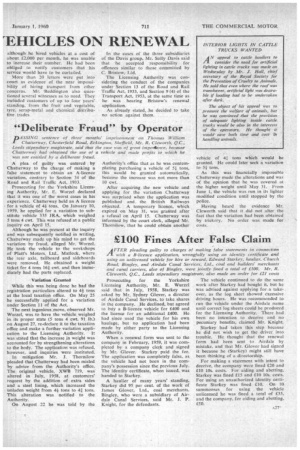"Deliberate Fraud" by Operator
Page 29

If you've noticed an error in this article please click here to report it so we can fix it.
pASSING sentence of three months' imprisonment on Thomas William Chatterway, Chesterfield Road, Eckingtori, Sheffield, Mr. R. Clewarth, Q.C., -Leeds stipendiary magistrate, said that the case was of great importance: because Chatterway had obtained the use of a vehicle and made profits to which he was not entitled by a deliberate fraud.
A plea of guilty was entered by Chatterway to the charge of making a false statement to obtain an A-licence variation, contrary to Section 34 of the Road and Rail Traffic Act, 1933.
Prosecuting for the Yorkshire Licensing Authority, Mr. E. Wurzel declared that it was one of the worst cases in his experience. Chatterway held an A licence for a vehicle of 4tons. On January 10, 1959: he applied for a variation to substitute vehicle 335 JRA, which weighed 5 tons 4 cwt. This was refused at a public inquiry on April 15.
Although he was present at the inquiry and was subsequently notified in writing, Chatterway made up his mind to get the variation by fraud, alleged Mr. Wurzel. He took the vehicle to the workshops of Platt's Motors. Ltd., Matlock, where the rear axle, tailboard and sideboards were removed. He obtained a weight ticket for 4 tons 161 cwt. and then immediately had the parts replaced.
Variation Granted While this was being done he had the registration particulars altered to 4+ tons at the local taxation office. On May 25 be successfully applied for a variation under Section 11 of the Act.
The next ingenious,move, observed Mr. Wurzel, was to have the vehicle weighed in its proper state (5 tons 4 cwt, 41 lb.) on August 27, re-declare it to the taxation office and make a further variation application to the Licensing Authority. It was stated that the increase in weight was accounted for by strengthening alterations to the body. The application was refused, however, and inquiries were instituted.
In mitigation Mr. J. Thornilow pleaded that Chatterway bad been misled by advice fromthe Authority's office. The original vehicle, XWB 719, was altered in July, 1958, at customers' request by the addition of extra sides and a steel lining, which increased the unladen weight from 4+ tons to 42 tons. This alteration was notified to the Authority,
On August 22 he was told by the Authority's office that as he was contemplating purchasing a vehicle of 5+ tons, this would be granted automatically, because the increase was not more than 10 cwt.
After acquiring the new vehicle and applying for the variation Chatterway was surprised when the application was published and. the British Railways objected. A temporary licence, which expired on May 31, was granted after a refusal on April 15. Chatterway was informed by the court clerk, alleged Mr. Thornilow, that he could obtain another vehicle of 4tons which would be granted. He could later seek a variation to 5+ tons. • • As this was financially impossible Chatterway made the alterations and was of the opinion that he was covered at the higher weight until May 31. From June I, the vehicle was run in its lighter modified condition until stopped by the
police.
Having heard the evidence Mr. Cleworth said that it did not alter the -fact that the variation had been obtained by trickery. No order was made for costs.




























































































